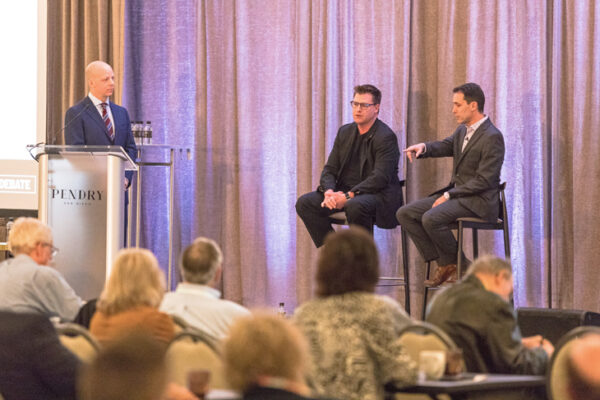The New Wealth Tax Is Calling… It’s for You
- Democrats have proposed various “wealth taxes” to ensure the rich pay their “fair share” and to fund lofty social programs.
- But, as Alexander Green explains and tax economics have shown, these taxes are sure to impact middle-class families as well.
It’s been well said that wealth is not what you make, it’s what you keep.
Yet a lot of folks – even those with higher-than-average incomes – find it awfully hard to keep much of what they make. Why?
One answer might be kids; pets; house payments; car payments; student loan payments; credit card payments; home, auto, health and life insurance premiums; groceries; utilities; maintenance and repairs; unforeseen expenses; and the countless goods and services we all want and need.
Life isn’t cheap.
Yet the biggest hurdle between you and financial independence is the hardest to avoid: the taxman.
Federal, state and local governments tax your income when you work, tax your purchases when you spend, tax your interest when you save, tax your dividends and capital gains when you invest, tax your home where you reside and – if you spend a lifetime diligently working, saving and investing – tax what’s left over when you die.
Talk about thorough.
Yet Senators Elizabeth Warren and Bernie Sanders are completists. They argue passionately for yet another tax, one that confiscates wealth simply because it exists.
Though critics call it unconstitutional, Warren proposes an annual asset tax of 2% on households worth more than $50 million and 3% on those worth more than a billion.
Sanders’ would start at 1% on households worth $32 million and 8% on those worth more than $10 billion.
Since most Americans are worth considerably less than $32 million – not to mention $10 billion – it is no surprise that there is little public outcry against these proposals.
Indeed, they enjoy a considerable degree of support in some quarters. But is this wise?
History suggests it is not. Let’s take a quick look at past attempts to tax “the rich” in this country.
For most of the nation’s history, there was no tax on what citizens earned. Yet in 1913, the states ratified the 16th Amendment to the Constitution, permitting a progressive income tax.
Congress set the top rate at a mere 7%. And only high income earners had to pay it. A married couple was taxed only if they had income equivalent to $118,700 or more in today’s dollars.
But that didn’t last long.
The minimum threshold for income taxation quickly came down. And the rate of taxation went just as rapidly up, hitting a gut-wrenching 90% under President Franklin Roosevelt.
Today the overwhelming majority of middle-class households pay income taxes. So much for just “soaking the rich.”
The same thing happened with the alternative minimum tax (AMT).
In 1969, Congress noticed that 155 Americans with high income used so many legal deductions and other tax breaks that they paid nothing in federal income taxes. So Congress instituted the AMT to promote fairness.
Unfortunately, the tax wasn’t indexed for inflation. Within a few years, tens of thousands of middle-class households were paying it.
And while the AMT is inflation-adjusted today, it kicks in at just $71,700. I wonder how many readers consider someone at this income level – before local, state and federal taxes – “rich.”
Turning back to the proposed wealth tax, how long would it be before the rate went up and the beginning wealth threshold came down?
Especially since the two politicians proposing the tax also favor a cornucopia of budget busters, including Medicare for All, the Green New Deal, college debt forgiveness, free college tuition, a federal jobs guarantee, universal basic income, paid family leave, slavery reparations and a significant increase in existing social welfare programs.
If you really believe a handful of billionaires can pick up that tab in a nation of 328 million people, I have bad news.
It’s called reality.
True, Forbes reported this month that the total net worth of the 400 richest Americans just hit a record-breaking $2.96 trillion.
Yet that’s a drop in the bucket compared with our current $22.8 trillion national debt and further $126.3 trillion in unfunded liabilities for Social Security, Medicare and Medicaid.
So who the heck would end up paying for all those new programs?
I’ll let you in on a little secret. If a new wealth tax is coming, it’s coming for you. History shows it’s just a matter of when.
But shouldn’t the rich pay their fair share? Indeed, they should. That’s why I’ll cover that important topic in my next column.
[adzerk-get-ad zone="245143" size="4"]About Alexander Green
Alexander Green is the Chief Investment Strategist of The Oxford Club, the world’s largest financial fellowship. For 16 years, Alex worked as an investment advisor, research analyst and portfolio manager on Wall Street. After developing his extensive knowledge and achieving financial independence, he retired at the age of 43.
Since then, he has been living “the second half of his life.” He runs The Oxford Communiqué, one of the most highly regarded publications in the industry. He also operates three fast-paced trading services: The Momentum Alert, The Insider Alert and Oxford Microcap Trader. In addition, he writes for Liberty Through Wealth, a free daily e-letter focused on financial freedom.
Alex is also the author of four New York Times bestselling books: The Gone Fishin’ Portfolio: Get Wise, Get Wealthy… and Get On With Your Life; The Secret of Shelter Island: Money and What Matters; Beyond Wealth: The Road Map to a Rich Life; and An Embarrassment of Riches: Tapping Into the World’s Greatest Legacy of Wealth.






